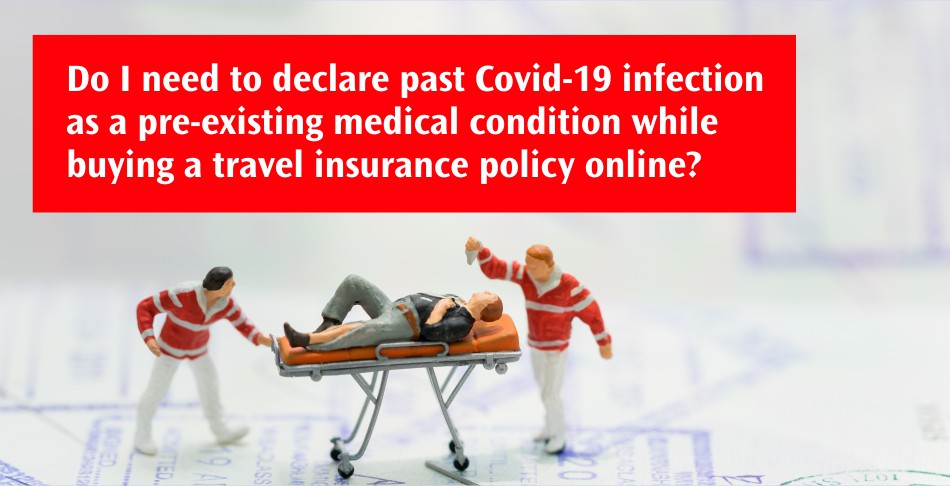Do I need to declare past Covid-19 infection as a pre-existing health condition while buying a travel insurance policy online?
Do I need to declare past Covid-19 infection as a pre-existing health condition while buying a travel insurance policy online?
Published on April 12, 2021. EST READ TIME: 3 minutes

One day flights are operating, another day they are not. One day there are rumours of an impending lockdown, the next day state authorities clear the air denying it. Along with great risk to life, the Covid-19 also brought in a great deal of uncertainty in our lives. This year has been comparatively better and people are travelling again. This time around, people are supposed to follow all Covid-19 protocols, and because of that there always seems to be a need for more information and clarity.
Take the example of Mr. Pandey, who had tested Covid-19 positive six months ago and recovered within a couple of months. Now that he is flying to Sri Lanka for vacation, he doesn’t know if he needs to declare past infection as a pre-existing health condition while taking travel insurance online. Let’s help him out.
1. Travel insurance and pre-existing diseases
We know why travel insurance policies are considered important. They are so crucial that you can’t visit many countries without one. Also, healthcare facilities at tourist destinations are quite expensive and if the visitor falls sick or injures himself in an accident, it will not only ruin his stay, it will cost him a fortune in health bills. However, if the person has travel insurance, the insurer will take care of the expenditure. Travel insurance insures you against any such unforeseen circumstances one may encounter while travelling.
But when we talk about health insurance, do we also mean health complications arising out of a pre-existing disease? Well, a travel insurance policy may or may not include pre-existing health conditions. The terms and conditions in the travel insurance policy differ from one person to another and also from one insurance company to another. There have been cases when applications for travel insurance were rejected because according to the insurer the applicants had a high-risk, pre-existing condition. So, when a person has a critical illness like heart disease, it becomes difficult for them to obtain travel insurance.
Similarly, there have been cases where the insurer has rejected claim requests arising out of non-disclosed pre-existing health conditions. Therefore, you should disclose information about your existing conditions in your health history. The rule applies even if you are not seeking coverage for pre-existing conditions. The premium would obviously be steeper if you seek coverage for your pre-existing conditions. You may have to undergo a health assessment as well before you get the policy.
2. So, what’s the rule regarding Covid-19?
When the coronavirus pandemic impacted the tourism sector drastically, some insurers temporarily stopped selling travel insurance policies. Now, policies are being designed keeping the current situation in mind.
So, to answer your question, yes, if you have been diagnosed previously with Covid-19, you should inform the insurance company about it when you are asked about your health.
Whether Covid-19 is categorised as a pre-existing condition or not will depend on the insurer. Supposedly, you make a claim at some point of travel, and the insurer finds that you had withheld information, not only will your claim request get rejected, but your policy may be rendered invalid. Always remember that your insurer has the right to request access to your previous health records if you make a claim and so, there is no point in hiding information.
This, however, doesn’t mean that the health coverage as part of Mr. Pandey’s policy won’t cover him if he gets diagnosed a second time with Covid-19. If his policy has a Covid-19 cover mentioned, then he will receive the amount spent in treatment. Most insurers understand that the risk of infection is always there as the pandemic is not over yet and, therefore, provide full or partial cover regarding health claims arising from coronavirus-related hospitalisation. Similarly, the insurance may also pay for cancellation charges if Mr. Pandey becomes Covid positive before the trip or for the accommodation if he has to extend his trip because of the same reason. But if Mr. Pandey purchases a policy after testing positive hoping to get well by travel date, but his condition doesn’t improve, then he won’t be covered for cancellations as he would, then have an excluded pre-existing condition.
To reiterate, it all depends on your policy wording.
Conclusion
Whether you are planning to get new travel insurance online , or continue with an existing one, ensure that you are well-aware of the inclusions and exclusions. When facing health or any other issue, the last thing you want is your policy will not cover all the expenses. In case of any confusion regarding what is mentioned in the policy documents, you should get in touch with the insurer seeking more clarity.
Disclaimer: The above information is for illustrative purpose only. For more details, please refer to policy wordings and prospectus before concluding the sales.











 Health Insurance
Health Insurance  Travel Insurance
Travel Insurance  Car Insurance
Car Insurance  Cyber Insurance
Cyber Insurance  Critical Illness Insurance
Critical Illness Insurance
 Pet Insurance
Pet Insurance
 Bike/Two Wheeler Insurance
Bike/Two Wheeler Insurance  Home Insurance
Home Insurance  Third Party Vehicle Ins.
Third Party Vehicle Ins.  Tractor Insurance
Tractor Insurance  Goods Carrying Vehicle Ins.
Goods Carrying Vehicle Ins.  Passenger Carrying Vehicle Ins.
Passenger Carrying Vehicle Ins.  Compulsory Personal Accident Insurance
Compulsory Personal Accident Insurance  Travel Insurance
Travel Insurance  Rural
Rural 











